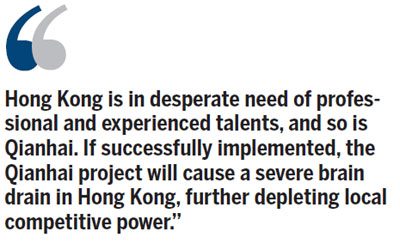Who really benefits from Qianhai development?
Updated: 2013-09-20 15:34
By Eddy Li(HK Edition)
|
|||||||||
Last month, the third piece of Qianhai land, covering an area of 500,000 sq km, was successfully bid by China Resources Land, at a price of nearly HK$13.8 billion. The average price of HK$27,340 per square meter, as expected, set a new mark after the record-breaking first and second land bids, both of which were won by the Excellence Group, enabling this piece of land to become Shenzhen's new prime site.
Through the three auctions, the Qianhai Management Authority has so far obtained almost HK$30 billion. The subsequent responses, including the public voice of Hong Kong, seemed positive and optimistic.
Flaunted as the pilot area for propelling Hong Kong-Guangdong closer cooperation and integrated development, and as the mission bearer promoting the internationalization of the RMB, Qianhai has received significant attention and promising expectations from the public. Many Hong Kong people believe certain industries will not only be able to tap into the mainland market with the aid of Qianhai, but can also develop a new way of cooperating with mainland companies to enter the international market.
I, personally, do not think the Qianhai project benefits Hong Kong in such an optimistic way, and am concerned for three main reasons.

First, I worry the Qianhai project will end up like the Cyberport project in Hong Kong, the result of which will be the establishment of a program of real estate for Shenzhen by Hong Kong. The bidding price of the first two land parcels exceeded that of other competitors immensely, setting a high standard for land values in the area. And the beneficiaries are three giant landowners in Qianhai - China Merchants Group, China International Marine Containers (Group) Ltd (CIMC) and Shenzhen International Holdings. These groups own lands covering from 380,000 to 4 million square meters, the price of which cost only from HK$500 to HK$1,000 per sq m. But the current land premium has multiplied by 10 times, bringing incredible wealth to the three owners. According to reports, although the auction has not much influenced the office building market in Shenzhen, its impact on the price of the surrounding residential housing is significant, which went up by 30 percent in less than a year.
Second, in the future, Qianhai might affect Hong Kong's position as an international financial center. On June 29, 2012, the central government announced the six main categories for the policy framework of "early and pilot implementation" - that is, the finance and banking sector, taxation sector, legal system, talents, education and healthcare sector, and the telecom sector. The finance and banking sector is the priority, as the goal of Qianhai is to become "the Manhattan of the Pearl River Delta". I have discussed this with some friends from the financial industry, and they expressed concerns as well. The most important variant lies in government policy, so that if financial institutes in Hong Kong move their business to Qianhai, the role of Hong Kong as an offshore RMB business center will no longer exist. According to economic statistics, the finance and banking sector, as one of the four economic kingpins of the city, is gradually losing its GDP proportion from 21.1 percent in 2007 to 16.1 percent in 2011. We should be alert to this phenomenon and keep our edge.
Last but not least, Hong Kong is in desperate need of professional and experienced talents, and so is Qianhai. If successfully implemented, the Qianhai project will cause a severe brain drain in Hong Kong, further depleting local competitive power.
We still have to wait and see if Qianhai really will benefit Hong Kong, but my big worry is because the previous government was not familiar with the operations of the mainland's local governments, who might use the theme of "cooperation with Hong Kong" to gain supporting policies from the central government. If this is really the case, then who is the ultimate beneficiary of the project? And will Hong Kong be hoist by its own petard?
The author is vice-president of the Chinese Manufacturers' Association of Hong Kong.

(HK Edition 09/20/2013 page9)